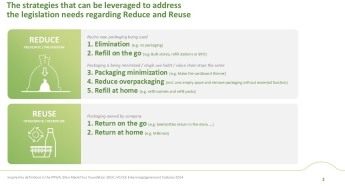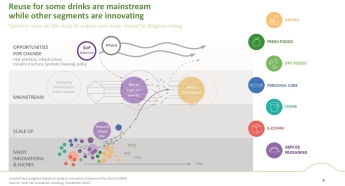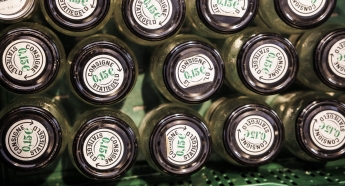Packaging prevention and reuse are high up on the agenda, and new European packaging legislation has only increased its urgency. But anyone looking at the situation today must conclude that there is still a long way to go. ‘A lot of changes are taking place, but at the same time there’s a great need for better cooperation, more knowledge-sharing and the scaling up of initiatives,’ says Hélène Snyers, Expert Reduce & Reuse at Fost Plus.
Reusable packaging may already be a hot topic, yet it’s not exactly a new phenomenon. Belgian beer brewers and beverage producers, for example, have long had a reuse system in place for glass bottles. Reusable pallets or crates are also mainstream in the world of business packaging. And at festivals and events, reusable cups – and in some cases eating utensils – are now well established.

PPWR will be a game-changer
In other sectors, though, there is still a long way to go. New European rules – the Packaging and Packaging Waste Regulation 2025/40 (PPWR) – are bound to gain momentum. It is clear that Europe wants to reduce single-use plastic packaging. A lot of single-use packaging will disappear from the market, and there will be specific and ambitious targets that will require great efforts in sectors such as hospitality and retail. (See text box.)
It’s also an immediate game-changer for Fost Plus. ‘Packaging recycling – traditionally our core business – is and will of course remain important. The PPWR includes many measures to further improve the recyclability of packaging and increase the use of recycled content. But if we want to help our members comply with their future legal obligations, we as an organisation must also fully commit to reduction and reuse,’ stresses Hélène Snyers.
The need to scale up
There’s work to be done, then. Fortunately, there is a growing realisation among a lot of companies and organisations that things can and should be done differently. ‘During our innovation scouting, we’ve noticed that things are changing,’ says Hélène Snyers. ‘We’re seeing lots of individual initiatives, promising pilot projects and exciting experiments in a wide variety of sectors. At the same time, we’ve found that companies and organisations often struggle to scale up these initiatives and make them viable.’
Collaboration is the key word here – between companies in the same sector and competing companies, but also with packaging manufacturers, software suppliers, logistics players or car washes. Earlier this year, Fost Plus launched the Reduce & Re-Use MatchMaker, which makes it easier to find the right partner. ‘We’ve brought together the various providers and initiatives in a tool that’s available for free on our website. By the way, companies not yet on our list are still welcome to apply. A simple email is enough.’

Learning together
It is also clear that the impact will be different for each sector, as will the solutions. Some products can be sold or shipped without packaging, for others the challenge lies in setting up logistical return systems, and in yet other cases the main focus is on re-fill, at the consumer’s home or in-store.
Fost Plus therefore doesn’t see itself as the absolute expert in this field. ‘We don’t have a monopoly on the truth. On the contrary, like our members, we’re exploring different paths and discovering solutions. By sharing best practices and successful projects, we aim to inspire companies and encourage cross-pollination between different sectors.’

Opportunities for anyone taking a smart approach
‘Prevention and reuse in practice often also requires a re-think,’ says Hélène Snyers. ‘You don’t just replace conventional packaging one-to-one: you rethink the whole product-packaging combination. For example, a liquid shampoo in a plastic bottle can become a soap bar that needs much less packaging, if any at all. With refill-at-home, beverage companies can sell concentrates to which consumers add their own water at home, eliminating the need to carry water and bottles.’
‘Sustainable packaging isn’t just a constraint or an extra cost, then, but an opportunity to develop new products and business models, offer additional services or reward loyal customers. And that offers a lot of opportunities for companies that are smart about it,’ concludes Hélène Snyers.
Reduce & Reuse: what does the PPWR say?
The new European packaging legislation PPWR (the Packaging and Packaging Waste Regulation) came into force earlier this year and will have a major impact on the packaging world. The European Commission has opted all-out for reduction and reuse, with ambitious targets for companies as well as national governments. Below are some of the most notable targets in this area.
- Each member state must reduce packaging waste per capita by 5% by 2030 compared to 2018. By 2035, the volume must have decreased by 10% compared to 2018 and by 15% by 2040. Member states must also introduce specific measures to reduce single-use plastic packaging.
- There will be a ban on single-use plastic packaging for various uses: unprocessed fruit and vegetables, individual portions of sauces, spices, sugar or coffee creamer in the catering sector and individually wrapped soaps and shampoos in hotels.
- From 1 January 2030, retailers with a sales area of more than 400 sq m should strive to reserve 10% of that area for refill stations with both food and non-food products.
- 10% of all beverage packaging offered by retailers must be reusable by 2030. By 2040, that figure must rise to 40 per cent.
- From 12 February 2027, catering outlets must offer consumers the option of bringing their own receptacles (Bring-Your-Own). They must also clearly inform customers of that possibility.
- By 2028, catering outlets must offer a reusable packaging option for takeaway meals. By 2030, they should strive to make reusable packaging account for 10% of sales.
- By 2030, 40% of transport packaging – including e-commerce – should become reusable. By 2040, that figure must rise to 75%.Transport packaging that circulates within the company (for example between different sites and branches) must be 100% reusable.
How can Fost Plus help you?
Do you want to explore the possibilities for reducing and reusing your packaging, but are unsure where to start? Are you looking for the right partners? Are you working on a reuse project but you have got stuck somewhere? Or you just want to share a successful experience? We'd love to hear about it! Get in touch with our Reduce & Reuse Team via the contact form.
